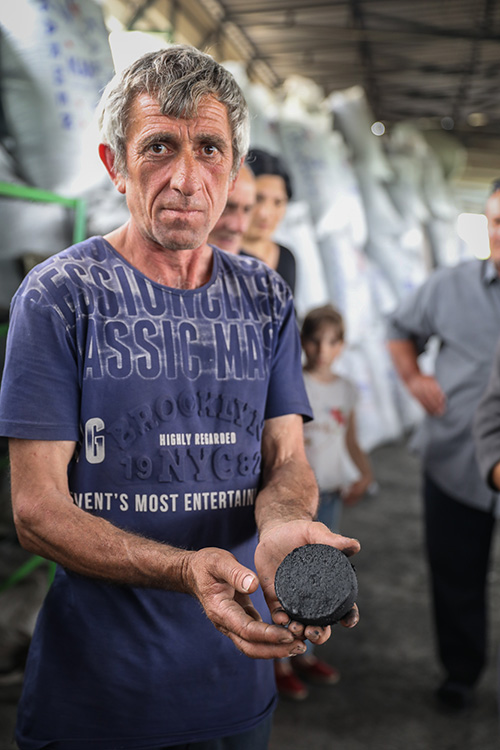Stories of Change

A cooperative member shows off one of the charcoal briquettes.
A family in rural Georgia can be forced to spend up to a third of their income on energy.
Lower bills, extra income and cleaner fuel in Georgia
You may have heard the rule of thumb that you shouldn’t spend more than a third of your income on housing. But what if it wasn’t the rent or mortgage that was so expensive? What if it was your utility bills?
For families in remote rural parts of western Georgia, accessing affordable energy is a huge challenge. People here rely on trees and shrubs for firewood and on dried animal dung, referred to as biomass, for cooking and heating. They often can’t find enough firewood or biomass for heating their homes or cooking, though. The price of electricity is extraordinarily high here, so families can’t afford to pay for electricity to meet the needs, either.
This is called energy poverty, and it is often women and children who bear the burden of the problems that come from energy poverty.
“Among the many household challenges, the main problem for our family is trying to get fuel to heat the house and cook meals. It is very hard to haul heavy firewood every day and travel long distances with such a load. I often get pain in my knees and my back. In addition, expenses for gas and electricity comprises some 30 percent of our scarce incomes,” says Natia Gunjua.
Natia lives in the village of Kheda of Khobar municipality. She is a mother of three and grandmother of two. All three generations live together in their modest house. The family’s main source of income is a small plot of land where they grow bay laurel trees, fruits and potatoes to sell. Natia’s husband is unemployed, but he can often find odd jobs to help support the large family. A significant amount of the burden of household finances lies on Natia and their children. The income they receive is hardly enough to make ends meet and cover basic needs.
Then a business idea arose from CWS’s partner in Georgia, Rural Community Development Association. What if those bay laurel trees could help generate extra income, fight energy poverty and protect the environment all at once?
Traditionally, the bay laurels were grown for their leaves, which can be sold. Then the branches were burned in the open as organic waste. “It was explained to us that the residue of laurel branches that we burned in the open could be used for making fuel briquettes for heating and cooking. We liked the idea, as this could provide us with the opportunity to have fuel almost free of charge and decrease expenses for fuel by $190 per month,” Natia explains. She and her neighbors started a cooperative to produce briquettes. The cooperative provides employment for several people, and even more can earn extra income by providing laurel branches from their own land.
So far, things are off to a great start. “Thanks to the enterprise, we also have extra income, making an additional $150 per month,” Natia explains, “I know that Christmas and New Year will be happy for me and my family, as we’ll have enough fuel briquettes for heating and cooking and with money we saved, we’ll be able to buy some items for the children and family. In addition, I’ll have more time to attend to the children and grandchildren as I don’t have to collect wood in summer for heating the water, cooking and washing.”
Natia and her neighbors are confident that their social enterprise for making fuel briquettes from laurel residue will bring about a better quality of life that will create a sound foundation for the future in their village.
